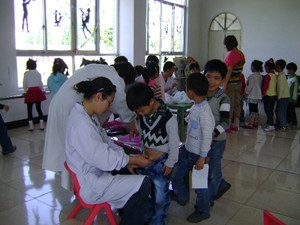(单词翻译:单击)

RAY SUAREZ: Get close enough to downtown Austin, Texas, and it's not hard to hear why it's called the live music capital of the world. Get a little closer, and the musicians themselves tell a quieter story.
That's John Pointer on stage now at Antone's Nightclub. He's a beat-boxing, boot-stomping singer-songwriter who also has type 1 diabetes. Like the average Austin musician, he makes less than $16,000 a year, and he can't afford health insurance.
JOHN POINTER, musician: So many people said, well, then just get a job. But I think the 10 Austin Music Awards and the national television commercials and the stages upon which I have performed and the audiences that come to see me would disagree that I should just quit and get a job that gives me health care.
RAY SUAREZ: Having diabetes made it difficult for Pointer to find an affordable primary care doctor in Austin. He was paying several hundred dollars a month for coverage in the state's high-risk insurance pool, an amount that consumed much of his take-home cash.
Then, one day, Pointer decided to check into an unusual program designed for people like him. It's called the Health Alliance for Austin Musicians, or HAAM. Similar in some ways to an insurance company, the group connects with area health providers, works out reimbursement rates, and helps keep out-of-pocket costs for members manageable.
HAAM executive director Carolyn Schwarz says it's the least this city can do.
CAROLYN SCHWARZ, Health Alliance for Austin Musicians: The music industry is a $2 billion industry here in Austin. Any night of the week, you can go to one of over 250 venues to go see live music. It's at our grocery stores, it's in clubs, I mean, everywhere you go in Austin. We're just used to having live music. And so I think of any community that would support something like this, Austin is the ideal place.
RAY SUAREZ: Schwarz helped launch HAAM in 2005, and continues to run the group today.
She's quick to point out that, despite the similarities, HAAM isn't health insurance. Musicians making less than 250 percent of the poverty level are linked directly with health care providers offering reduced rates for everything from primary care to vision and hearing. HAAM pays for most of the extra costs through grants and fund-raising.
CAROLYN SCHWARZ: It does only help the musicians while they're here in Austin, but our musicians had nothing before HAAM, and so the method that they used was called the walk-it-off method. With this program, they have access to a 24-hour nurse call center. They're getting urgent care appointments in a primary care setting. It's very cost-effective for our community.
RAY SUAREZ: The noteworthy result, according to musician Ginger Leigh, is knowing that an unexpected health disaster won't lead to financial ruin. Before HAAM, she spent many years uninsured, and hoping for the best.
GINGER LEIGH, musician: And I wouldn't go to doctors as much as I probably should have, because when you can't afford it, you're afraid that they're going to find something that's a really big problem, and all of a sudden your entire life is going to change because you're going to be strapped with hundreds of thousands of dollars of medical bills if it is something.
RAY SUAREZ: That very easily could have been her story. But Leigh discovered HAAM a couple of years before she found a lump in her right breast.
Many procedures followed, including a lumpectomy, a mastectomy, and reconstructive surgery. But, to Leigh's relief, most of that was paid for through small co-pays, the charity care donated by a local health group and HAAM.
GINGER LEIGH: I would have financially been completely devastated to have had to walk away with $130,000 to $150,000 in medical expenses. And I certainly couldn't keep doing music to pay for that.
RAY SUAREZ: She's now cancer-free.
So could this kind of set-up be replicated in other parts of the country? Soul singer Akina Adderley doesn't see why not. She's one of about 3,000 Austin musicians who have accessed HAAM's benefits so far. More join every day.
And even though some young adults feel they don't need health coverage, most of those enrolled in HAAM are 40 or younger, healthy, and hoping to stay that way.
AKINA ADDERLEY, musician: Being able to get up and get out and perform in shows and record on albums, that's our livelihood. So, without access to medication or treatment or therapy or things of that nature, when it comes right down to it, if you get sick, then if you don't have help, you are just out and just not getting any income in, nor taking proactive steps to make yourself better.
RAY SUAREZ: It's not clear what the impact will be on organizations like HAAM when the rest of the health care reform law goes live.
In Texas, the future is especially murky, because officials say they won't expand Medicaid to cover more low-income Americans. But whatever happens, for the musicians of tomorrow, there's a health care option out there they can afford, if only within Austin's famous city limits.


